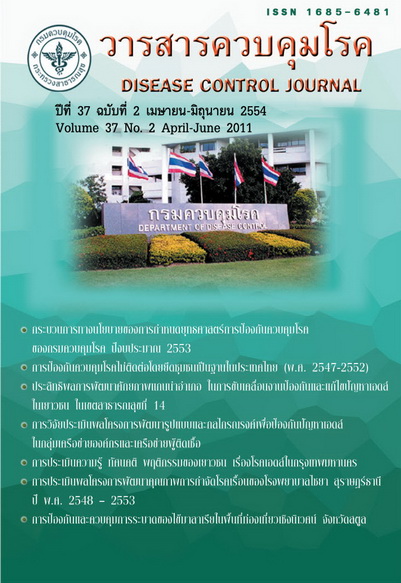Effectiveness of Developmental Program for District Core Teams in Mobilizing HIV/AIDS Prevention among Youth in Public Health Office Region 14
Keywords:
District Core team, Youth Developmental Program on AIDSAbstract
This study used a quasi-experimental design to evaluate the effectiveness of a capacity building program for district core teams in developing a task force on HIV/AIDS prevention among young people. The capacity building program was adapted from a sexuality education and learning design created by a global health group PATH and a guideline from Ottawa Charter for health promotion. The study subjects consisting of 30 community leaders from 6 districts of Public Health Office Region 14 were evaluated after 2-year intervention programs (from October 2008-September 2010). The program interventions were 1) providing a training course for core teams to improve their conceptual framework and work practices, 2) field visit for supporting and follow-up, 3) organizing a knowledge sharing forums and 4) setting an after action review at the end of the project. The results indicated statistical significant increases in knowledge and attitude of HIV/AIDS-related issues in the intervention group (p-value < 0.01). The effectiveness of capacity building program for district core teams on HIV/AIDS prevention was demonstrated. The qualitative evaluation revealed that 5 district core teams were able to create HIV/AIDS prevention task forces for youth in the areas by acting as a strategic manager and developed mechanisms such as a working group from all relevant sectors, using and analyzing useful information, developing integrative and effective plan which focusing on building capacity for community leaders who were responsible for youths, and convincing the local government to get involve in annual work plan and budgetary. Thus, capacity building for district core teams should be continuously implemented to improve systematic conceptual framework for developing HIV/AIDS prevention task force as well as to further adapt to be strengthened and sustainable districts on disease prevention and control according to the policy of the Department of Disease control.
Downloads
References
2. รายงานผลการตรวจราชการแบบบูรณาการเพื่อมุ่งผลสัมฤทธิ์ ปีงบประมาณ 2551: โครงการป้องกันและแก้ไขปัญหาเอดส์ เขตตรวจราชการที่ 14. (เอกสารอัดสำเนา)
3. รายงานสรุปผลการดำเนินงานป้องกันและแก้ไขปัญหาเอดส์อำเภอ ปี 2551 สำนักงานป้องกันควบคุมโรคที่ 5 นครราชสีมา. (เอกสารอัดสำเนา)
4. รายงานหญิงที่มาฝากครรภ์ในโรงพยาบาลของจังหวัดใน เขตตรวจราชการที่ 14 ปี 2551. (เอกสารอัดสำเนา)
5. สำนักโรคเอดส์ วัณโรค และโรคติดต่อทางเพศสัมพันธ์ กรมควบคุมโรค กระทรวงสาธารณสุข. รายงานประจำปีโรคติดต่อทางเพศสัมพันธ์ ปี 2551. กรุงเทพ
6. The Thai Working Group on HIV/AIDS Projection. Projection for HIV/AIDS in Thailand: 2000-2020. Bangkok:Karnsana printing Press, 2001; 27
7. สำนักระบาดวิทยา กรมควบคุมโรค. สถานการณ์โรคเอดส์ วัณโรค และโรคติดต่อทางเพศสัมพันธ์ พ.ศ.2550. สำนักงานกิจการโรงพิมพ์องค์การสงเคราะห์ทหารผ่านศึก, 2551.
8. องค์การแพธ. คู่มือการจัดกระบวนการเรียนรู้เพศศึกษา. กรุงเทพฯ: โรงพิมพ์เออร์เจนท์แทค, 2551.
9. http://www.who.int/hpr/NPH/docs/ottawa_charter_hp.pdf
10. องค์การแพธ. รายงานผลสรุปการประเมินโครงการการจัดการเรียนรู้เพศศึกษา "ก้าวย่างอย่างเข้าใจ": ผลลัพธ์ในกลุ่มผู้เรียน (พ.ศ.2549-2551). โรงพิมพ์พี เอส ซัพพลาย, 2551.
11. มูลนิธิสถาบันวิจัยและพัฒนานโยบาย (สวน.). คู่มือการจัดการเชิงยุทธศาสตร์เพื่อป้องกันแก้ไขปัญหาอนามัยเจริญพันธุ์และเอดส์ในเยาวชน สำหรับองค์กรปกครองส่วนท้องถิ่นและกลุ่มภาคี. กรุงเทพฯ: 2554.
12. กรมควบคุมโรค. คู่มือประเมินอำเภอควบคุมโรคเข้มแข็งของบุคลากร กรมควบคุมโรค. 2554
13. วิจารณ์ พานิช. การจัดการความรู้ฉบับนักปฏิบัติพิมพ์ครั้งที่ 2. กรุงเทพฯ: บริษัทตถาคต พับลิเคชั่น จำกัด. 2548.
14. ประภัสสร สุวรรณบงกช, อนงค์ศิลป์ ด่านไพบูลย์, เสาวนีย์ วิบุลสันติ และ สมศักดิ์ นาคกลิ่นกูล การพัฒนารูปแบบการมีส่วนร่วมขององค์กรปกครองส่วนท้องถิ่นในการดำเนินงานป้องกันควบคุมโรคและภัยสุขภาพ. วารสารควบคุมโรค. 2552; 35: 4-10.
15. ชัยวัฒน์ ถิระพันธุ์. บรรณาธิการ. วิธีคิดกระบวนระบบ (Systems Thinking). กรุงเทพมหานคร: พิมพ์ครั้งที่ 2, โครงการเสริมสร้างการเรียนรู้เพื่อชุมชนเป็นสุข(สรส.) 2548.
Downloads
Published
How to Cite
Issue
Section
License
Articles published in the Disease Control Journal are considered as academic work, research or analysis of the personal opinion of the authors, not the opinion of the Thailand Department of Disease Control or editorial team. The authors must be responsible for their articles.






